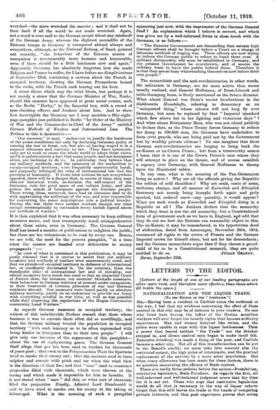LETTERS TO THE EDITOR.
[Letters of the length of one of our leading paragraphs are often more read, and therefore more effective, than those which fill treble the space.]
NATIONALIZATION AND THE LIQUOR. TRADE. [To 111E Enrroa or rag " SPECUTOIL"l Srs,—Having been a resident in Carlisle since the outbreak of the war, I feel that my evidence concerning the effect of State control in this city may be of interest to your readers. No one who lived here during the influx of the Gretna munition workers will ever forget the beastly sights that became ordinary occurrences. Men and women behaved like swine, and the police were unable to cope with this liquor lawlessness. Then a power that feared neither " the Trade " nor the drinker stepped in, and direct control soon began to make itself felt. Excessive drinking was made a, thing of the past, and Carlisle became a sober city. Not all of this transformation can be put to the Board's credit; we must take into account also the restricted output, the high price of intoxicants, and the gradual replacement of the navvies by a more sober population. Elia when every allowance has been made for these factors, there fa no question concerning the efficacy of State control.
There are really three policies before the nation—Probibition, restrictive legislation, State Purchase. Aa regards the first, all hell-informed and well-balanced judgment avers that the time for it is not yet. Those who urge that restrictive legislation would do all that is necessary in the way of liquor reform forget that this still leaves the trade in the hands of competing private interests, and that past experience proves that owing to the political influence of " the Trade " restrictive legislation finally becomes only as restrictive as "the Trade" wishes it to be, and lasts only as long as " the Trade " wishes it to last. The Trade organization are still too strong a power to leave in existence. Would any restrictive legislation be able to sup- press 42 per cent. of the licences in two years as State control has done in this city P The criticism of the Board's work in Carlisle from the teetotal standpoint rests largely on the fallacy that the mere advent of direct control ought to create a desire for total abstinence. Prohibitionists forget that the Board has had to deal with a community whose drinking habits are not transformed by a change of policy. Also these habits have been deliberately encouraged by " the Trade." The irony of the situation is that prohibitionists prefer that this Trade should still remain rather than that the State should have full control.
Personally, I believe that it is on the future generation that State control will have the most influence. When all the argu- ments that can be urged against State control have been stated, I am convinced that the youth of the nation have a better chance to grow up sober citizens when this dangerous trade is in the hands of the State than in the hands of those whose duty to their shareholders it is to sell as much drink as they can, where they can, and how they can.
If any further proof be needed of the Board's success, let those who need it ask the Carlisle citizens as a whole which regime they prefer to live under—the Board's or the brewers'; let them ask also whether they would care to turn over the present system lock, stock, and barrel to the former owners. The answer would be something like this: " We are under a system which, though not ideal, is the best that has yet been found to regulate a dangerous and sinister traffic."—I am,
Sir, &c., G. BRAMWELL EVENS. Wesley House, Fisher Street, Carlisle.



































 Previous page
Previous page